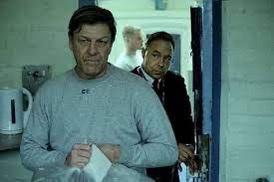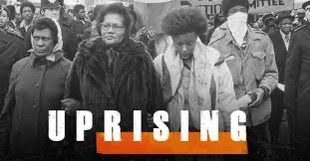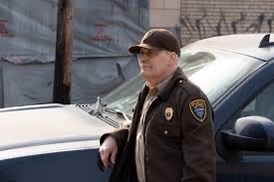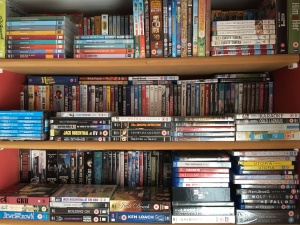
I haven’t written a blog about TV since May, for reasons which I have explained in previous postings, but I haven’t stopped watching as much as I can, so a general catch-up is well overdue and this will probably turn into a sort of review of the year. There are some significant things included on the best-of-year lists which have already started appearing and which I have yet to catch up with – Mare of Easttown and Succession among them – but I have 18 shows I want to comment on and, who knows, a shortlist may begin to emerge from which I can choose a top ten at the end of this month. I will look at these items in pairs, as there are some felicitous comparisons to be made along the way.
Covid has not only restricted and altered the programme-making process – it has also become, unsurprisingly, the subject matter and plot driver of some excellent new contemporary drama. Two of our finest writers, Dennis Kelly and Jack Thorne, responded to the effects of the pandemic and the lockdown with fine one-off pieces. Kelly’s Together (BBC2, June) mined the comic as well as the dramatic possibilities of an estranged couple thrown together and trapped in each other’s company by the constraints of lockdown. Sharon Horgan and James MacAvoy were terrific, whether striking sparks off each other, or confiding in us, the audience. All the frustrations and, inevitably, the tragedies of time under lockdown were there but it was much more – an intimate study of a relationship and human psychology.


The tragic part of Together was the death of Horgan’s character’s mother, alone in a care home, seen through Horgan’s helpless reaction to it. Jack Thorne’s Help (Channel 4, September), on the other hand, took us into a care home at the height of the first wave and made us look directly at the desperation of the situation. Not that it was all grim – like Together, the main focus was on the interaction of two characters and it also involved two very fine actors: Jodie Comer and Stephen Graham. But it was the section between the second and third breaks which lives longest in the memory – a single-take sequence in which Comer’s inexperienced care home helper tries valiantly, but ultimately unsuccessfully, to save the life of a resident reaching the final moments of the disease, while at the same time attempting to get help on the phone and run the care home on her own. It is a quite stunning and gripping 20 minutes of drama and brilliantly directed by Marc Munden. Together and Help are easy picks for the shortlist.

Two more of our very best writers gave us two of the best limited series of the year: Russell T. Davies’ It’s a Sin (Channel 4, February) and Jimmy McGovern’s Time (BBC1, June). Nobody but Davies could have dramatized the AIDS crisis of the 1980s in such a way – full of his trademark shifts from the acerbically witty to the devastatingly sad in the blink of an eye. Clearly a very personal project, it nevertheless hit a chord with its depiction of a helpless health service struggling to respond to an unprecedented threat. The final episode was extremely moving and also contained a stunning performance from Keeley Hawes – BAFTA will have a job on their hands to choose between her, Comer and Horgan next year. Fine acting was also at the heart of Time, from Stephen Graham (again) and Sean Bean, who seems to have undergone a wonderful late-career renaissance thanks to his collaborations with McGovern. Two more certainties for the growing shortlist.


Slavery and the history of racism have provided the background for a number of series, both fictional and factual, in the past few years. Watchmen and Lovecraft Country are two of the most prominent fictional ones, though they did not portray the actual experience of slavery directly. Barry Jenkins’ The Underground Railroad (Amazon, May) does do that, but in a way which is both horrifyingly real and symbolically magical. Most notably, the “railroad” itself, which in reality was a network of sympathisers who helped runaway slaves escape from the southern states, is also presented as a physical entity – literally a railroad running in tunnels. This fantasy element elevates the series from a howl against a historical injustice to a piece of masterly storytelling, though without losing sight of the history which underpins it at any point, which is quite an achievement. Another achievement is that the white characters are not the (understandably) cardboard cut-out villains of the earlier series, but fascinating character studies in their own right, most notably Ridgeway, played by Joel Egerton. On the factual side, the three-part Exterminate All the Brutes (Sky Documentaries, April) should have been an instructive companion piece, being based on a major book about the slave trade and historical racism in general. In parts, it was just that, but director Raoul Peck also introduced regular anachronistic fictionalisations which made little sense and interrupted the flow of the narrative. Whereas such fictionalisation was a strength of The Underground Railway and elevated it to greatness, in Exterminate All the Brutes it was a jarring distraction which fatally undermined the effect of the documentary. The former is an obvious inclusion in the shortlist – the latter doesn’t make it.


Staying with documentary, Steve Mc Queen and James Rogan’s Uprising (BBC1, July) actually was the perfect companion piece to last year’s Small Axe films, covering much of the same ground using archive footage and eyewitness interviews and emphasising what an excellent series the dramas were. The two things should have been transmitted at the same time (and probably will on future repeat), but on its own, Uprising was a very good and effective archive documentary. Similarly, Blair and Brown: the New Labour Revolution (BBC2, October) had all the relevant archive footage and talking heads, including the two main protagonists. Brown came across as too buttoned-up to give the answers you wanted, while Blair seemed open and responsive, but that was how he always came across, even when he was lying through his teeth, so a big pinch of salt, please. Both series were very watchable and instructive, but neither sufficiently extraordinary in terms of documentary form to warrant shortlisting.


Turning to music, Asif Kapadia’s 1971: the Year Music Changed Everything (Apple TV, May) contained a great amount of wonderful archive material, great music (of course) and fascinating backstories, but ultimately collapsed under the weight of its own ambition. Firstly, it was way too long at 8 hour-long parts and repeated itself endlessly. Secondly, it utterly failed to convince me of the premise in its title. Maybe it was the year that music reflected everything, but that could be argued of many years. The only thing it changed was music itself, but the same stricture applies. And where was Chirpy, Chirpy, Cheep Cheep? Much more to my liking was a wonderful and somewhat unheralded BBC4 documentary on the work of the great music documentarist, Christopher Nupen, who certainly was somebody who changed everything, at least in the field of presenting classical music on television. Listening through the Lens (October) was the perfect title for this tribute to a film making genius and the tributes from the likes of David Attenborough and Melvyn Bragg, as well as generous extracts from his films made the case for that description fully. I loved it and am putting it on the shortlist.


Making connections between the remaining titles I want to talk about is getting tough, but The Outlaws (BBC1, October) and The Cleaner (BBC1, September) were series written by and starring Britain’s two tallest comedians. Stephen Merchant’s series was the best thing he has done without Ricky Gervais and succeeded at the tough trick of combining comedy with a thriller narrative. It had a gallery of great characters and was very well performed and created by all concerned. Greg Davies’ piece, though occasionally successful, was inconsistent. It struck me that he was trying to create something along the lines of Inside No.9, with macabre storylines and different guest stars each week. Of the two, only The Outlaws makes the shortlist.


The next two series were things which I was eagerly looking forward to the return of, but which disappointed to the extent that I gave up on them half-way through. Fargo season 4 (Channel 4, May) was just too convoluted and sure of itself to engender any real engagement. The series has created its own style and cannot escape it even when it has taken it as far as it can, which I guess was bound to happen eventually. At least we had two wonderful seasons and one not bad one. Daisy Haggard’s Back to Life (BBC3, August), though, had only got to its second season before it found nowhere new to go.


I should also have given up on Your Honour (Sky Atlantic, March), but there was enough interesting material to keep me going despite the ludicrous coincidences we were expected to accept. In the end it was just ludicrous. Then American Rust (Sky Atlantic) started a few weeks ago with a similar plot device (an officer of the law is caught in a moral dilemma through personal involvement with a case), but there is, again, enough in the characters and dialogue to keep me going for the time being. I may yet give up on it as well, especially if there are many more shots of Jeff Daniels leaning on things.


My final pairing is two continuing and recently returned classics, still going strong and still drawing me in. Doctor Who: Flux (BBC1) was the best story from the Chibnall/Whitaker era and had the best single episode (Village of the Angels) since Peter Capaldi was alone in that tower. I’ve said it many times, but it is always at its best when dealing in multi-episode stories – though not, in this case, outstanding enough to make the shortlist. Curb Your Enthusiasm (Sky Comedy), on the other hand, is miraculously back to its very best – every episode has had me howling with laughter and that is enough to put it on the list.

So, my shortlist now looks like this:
Can’t Get You Out of my Head
Together
Help
It’s a Sin
Time
The Underground Railroad
Listening Through the Lens
The Outlaws
Curb Your Enthusiasm
So, we have 9 and there is some pretty good stuff there. I am confident there will be something between now and the end of the year to bump it up to 10 or beyond. Landscapers (Sky Atlantic) has started promisingly and I have a couple of other things to keep an eye on over Christmas.
Happy Christmas and good viewing, everybody.



Wot, no Vigil?
LikeLike
Sorry, another one I didn’t catch – it came at a busy time and I must admit the trailers put me off. When I see the words “from the producers of Line of Duty” I reach for my remote.
LikeLike
The other major missing series for me is The North Water. My 20 year old son and I sat in complete silence for every single episode. I’ve never seen such an unremittingly bleak and brutal drama – it was compelling, and brilliantly acted, and I think it will stay with me for ever. I would recommend it over Mare of Easttown.
I agree It’s A Sin and Time were brilliant, and despite such depressing subject matter, I love the humanity of all the characters, and the fact that both Davies and McGovern ended on a note of hope and redemption.
LikeLike
Couldn’t face The North Water after The Terror, though I’m sure it was better. I see It’s a Sin made number 1 in the Guardian list (as well as the BFI one). Seems to be a consensus there. Landscapers is great and looking forward to A Very British Scandal. Have a great Christmas.
LikeLike